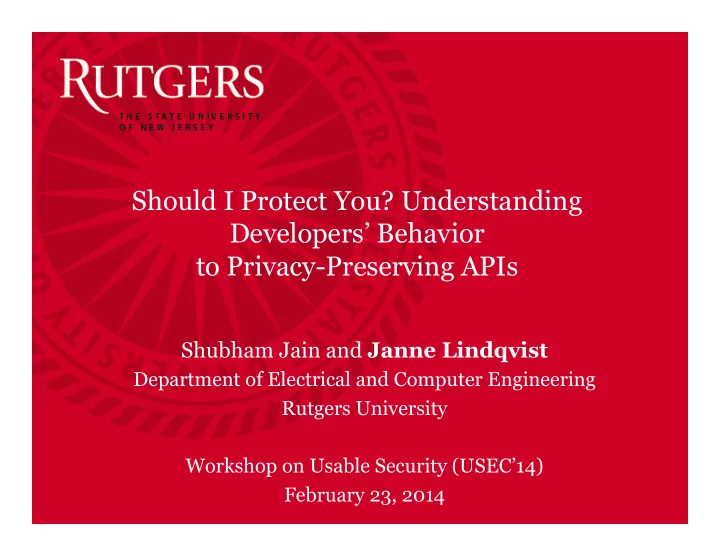

Should I Protect You? Understanding Developers’ Behavior to Privacy-Preserving APIs Shubham Jain and Janne Lindqvist Department of Electrical and Computer Engineering Rutgers University Workshop on Usable Security (USEC’14) February 23, 2014
Developers? Developers! Developers!
Privacy-Preserving API design? • Observation : today developers have options – take all, – or nothing • Evidence : some developers are trying to follow least privilege • 1. Question : Can we design a privacy- preserving clean-slate API?
Can We Nudge Developers? • 1. Question : Can we design a privacy-preserving API? – Yes – Other have done it, too! • What we should be asking : Can we nudge developers to make better user privacy decisions with API designs?
Localization Options (Permissions) • ACCESS_FINE_LOCATION (GPS) • ACCESS_COARSE_LOCATION (WiFi or cell network) • “To meet the privacy expectations of users when your app requests permission for coarse location (and not fine location), the system will not provide a user location estimate that’s more accurate than a city block.” – Android 4.2.
Android Location API //Acquire a reference to the system Location Manager LocationManager locationManager = (LocationManager) this.getSystemService (Context.LOCATION SERVICE); //Define a listener that responds to postal code updates LocationListener locationListener = new LocationListener() { public void onLocationChanged (Location location) { String msg = "Updated Location: " + Double.toString( location.getLatitude ()) + "," + Double.toString( location.getLongitude ()); • And then reverse geocoding
Example Modified API // Acquire a reference to the system Location Manager LocationManager locationManager = (LocationManager) this.getSystemService (Context.LOCATION SERVICE); // Define a listener that responds to postal code updates LocationListener locationListener = new LocationListener() { public void onPostalCodeChanged (Location location) { String zipCode = location.getPostalCode () ; getMyWeather (zipCode) ;
Method • Participants screened and randomly divided to five groups • Non-Android Group (Some Java experience) – Control Group (using just the baseline API) – Treatment group A (TA) – Treatment group B (TB) • Android Group (Some Experience with Java/Android) – Treatment group C (TC) – Treatment group D (TD) • No mention about privacy to avoid biasing participants. – Questions about privacy after completing the tasks
Method • Android Location baseline API documentation • Treatment Android Location API – Everything in the baseline API – And our modified APIs – Order of the presentation varied between treatment groups (TA, TC) vs (TB, TD) • Programming Tasks: – Weather app – Running app – Address app
Method: Lo-fi programming fiiom the basic meLa- j e rrs ranging Now considrr a diffcrrnt situation, phor to the choice of background one I have witnessed first-hand over color. The team .just barely has time the past few months: a development to incorporatr these comments into a team spends weeks designing an in- rwiscd design brforr committing terface. During the first few days, they construct a paper prototype of their initial thinking about all aspects of the design, and test it with typical by Marc Rettig representatives of the user commu-
Results Group Participants Used Our Reverse Copied ????????? API Geo example ???????? CG 6 N/A 3 2 1 TA 5 4 0 1 0 TB 6 3 1 1 1 TC 5 5 0 0 0 TD 3 2 1 0 0
Why? • “ I tried to make it the postal code or city because that is usually what people want. They don’t usually want latitude and longitude ” - TA2, on using the getPostalCode(), requestPostal- CodeUpdates() and onPostalCodeChanged() for the weather task. • “Geocoder was the most confusing part” - TB5.
Why not? • “ You get them [geocoordinates] from location manager. Then you have to use this part - geocoding. I tried to do that for this one but I didn’t really know how to ” - TB2. • “I may have chosen this [Geocoder class] because it was first. I was reading through and I saw this and I was like, oh that will work” - TD4.
When Asked About Privacy • “I know about them [location privacy issues]. It flashed my mind for a second, like do you want to track every single detail? But then I just continued doing what I was doing ” - TA3 (used our API). • “That’s why I tried to avoid GPS when possible because lots of people are sensitive to giving fine location data away. And I tried to use the network when possible because even if they’re sure they know you’re connected to this tower, still towers cover such a vast area and depending on where you are there is such a huge number of people attached to that network they cant identify who you are without more information on that” - TC1 (used our API).
When Asked About Privacy • “Your phone is capable of sending your coordinates at all times to a server. I chose to use postal code as opposed to street address or coordinates because I didn’t want to send out too much information” - TC4, discussing his code on weather application. • “I didn’t think about it [location privacy] because I just assume that once they [users] install the application they’ve already given permission for it.” - TC3
Limitations • Participants Rutgers CS/ECE undergrads/grads • Small group sizes, no statistical analysis • Monetary incentives: 3 rd party ad-network libraries • StackOverflow?
Conclusions • When approaching API documentation from a “blank slate” participants tend to follow the sample code closely. • First step to indicate that if developers have privacy- preserving examples in official documentation, developers could be using them instead of less privacy-preserving alternatives.
Shameless Plug • Afternoon session: Huiqing Fu et al. “A Field Study of Run- Time Access Disclosures on Android Smartphones” • Over 200 articles around the world. – MIT TR, Le Monde, Yahoo! News, ComputerWorld, Heise, Slashdot, The Register, NOS 3, IEEE Spectrum… – New Age Online (?), US liberal and conservative media
Thank you janne@winlab.rutgers.edu
BACKUP SLIDES
Caché Architecture (Amini et al., MobiSys’11) 21
Recommend
More recommend